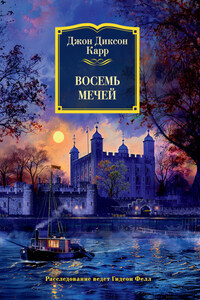CHAPTER I.
LAWYER AND CLIENT
Early one morning, in the spring of eighteen hundred and seventy-three, two young lawyers were seated in their private office. The firm name, painted in gilt letters upon the glass of the door, was DUDLEY & BLISS. Mortimer Dudley was the senior member, though not over thirty years old. Robert Bliss was two years younger.
Mr. Dudley was sorting some papers and deftly tying them into bundles with red tape. Why lawyers will persist in using tape of a sanguine color is an unsolvable mystery to me, unless it may be that they are loath to disturb the many old adages in which the significant couplet of words appears. However that may be, Mr. Dudley paused in his occupation, attracted by an exclamation from his partner, who had been reading a morning paper.
"What is it, Robert?" asked Mr. Dudley.
"Oh! Only another sensational murder case, destined, I imagine, to add more lustre to the name of some lawyer who doesn't need it. Mortimer, I wonder when our turn will come. Here we have been in these rooms for three months, and not a criminal case has come to us yet."
"Don't be impatient, Robert. We must not give up hope. Look at Munson. He was in the same class with us at college, and we all considered him a dunce. By accident he was engaged to defend that fellow who was accused of poisoning his landlady. Munson actually studied chemistry in order to defend the case. His cross-examination of the prosecution's experts made him famous. Who knows! We may get an opportunity like that some day."
"Some day! Yes, some day! I believe there is a song that begins that way. I always detested it. I do not like that word 'some day.' It's so beastly indefinite. I prefer 'to-day' or even 'to-morrow.' But let me read to you the account of this case. It is about that young woman who died so mysteriously, up in the boarding-house on West Twenty-sixth Street."
"I don't know anything about it, Robert. I haven't read the papers for three days. Tell me the main facts."
"Well, it is really a very curious story. It seems there was a young girl, twenty or thereabouts, living in town temporarily, whilst she studied music. Her name was Mabel Sloane. She is described as pretty, though that is a detail that the reporters always add. But, pretty or ugly, she died last Sunday morning, under rather peculiar circumstances. The doctors differed as to the cause of death."
"Why, there is nothing odd about that, is there?" Mr. Dudley smiled at his own wit. "Doctors disagree and the patient dies. That is the old adage. You have only reversed it. Your patient died, and the doctors then disagreed. Where's the odds?"
"The odds amount to this, Mortimer. One doctor signed a certificate of death, naming diphtheria as the cause. The other physician reported to the Board of Health that there were suspicious circumstances which led him to think that the woman might have died from poison."
"Poison? This is interesting."
"The more you hear, the more you will think so. In yesterday's papers it was announced that the Coroner had taken up the case, and that an autopsy would be held."
"Does this morning's paper give the result of the post-mortem?"
"Yes. Listen! 'The autopsy upon the body of Mabel Sloane, the beautiful young musician' – you see they still harp on the beautiful – 'young musician, whose mysterious death was reported yesterday, shows conclusively that the girl was poisoned. The doctors claim to have found morphine enough to kill three men. Thus the caution of Dr. Meredith, in notifying the Health Board of his suspicions, is to be commended. It is but just to say, however, that the doctors who made the post-mortem, entirely exonerate Dr. Fisher, the physician who certified that the death was caused by diphtheria, for they claim, curiously enough, that the woman would undoubtedly have died of that disease even if the morphine had not been administered. This opens up a most interesting set of complications. Why should any one poison a person who is about to die a natural death? It might be claimed that the murderer did not know that a fatal termination of the disease would ensue. This brings us to the most interesting fact, that the one who is suspected by the police is no other than the girl's sweetheart, who is himself a physician. Thus it is plain that he should have known that the disease would probably prove fatal, and under these circumstances it is almost inconceivable that he should have resorted to poison. Nevertheless, the detectives claim that they have incontestible evidence of his guilt, although they refuse to reveal what their proofs are. However, some facts leaked out yesterday which certainly tend to incriminate Dr. Emanuel Medjora, the suspected man. In the first place, Dr. Medjora has suddenly and completely disappeared. Inquiry at his office elicited the statement that he has not been there since the day before yesterday, which it will be remembered was the time when the Coroner first came into the case. Dr. Medjora has not been at his residence, and none of his friends has seen him. In short, if he had been swallowed by an earthquake he could not have vanished more swiftly. He was supposed to have been engaged to marry Miss Sloane, and as she was a beautiful girl, accomplished, and altogether charming, it has puzzled all who knew her, to understand why he should wish to destroy her. Some light may be thrown upon this, however, by the discovery at the autopsy, that she has been a mother. What has become of the child, or where it was born, is still a part of the mystery. Miss Sloane has lived at the Twenty-sixth Street house about three months, and as she has always been cheerful and happy, the boarders cannot reconcile this report of the doctors with what they knew of the woman. They claim, with much reason, that if her baby had died she should have had moments of despondency when her grief would have been noticeable. Or if the child were alive, then why did she never allude to it? Another significant fact is, that Dr. Medjora has been seen driving in the Park, recently, with a handsome woman, stylishly dressed, and evidently wealthy, as the coachman and footman wore expensive livery. Did the Doctor tire of his pretty little musician, and wish to marry his rich friend who owns the carriage and horses? His disappearance lends color to the theory.' There, what do you think of that?" said Mr. Bliss, throwing aside the newspaper.










